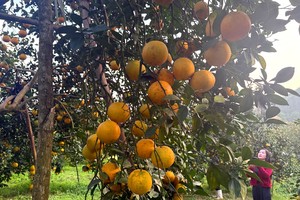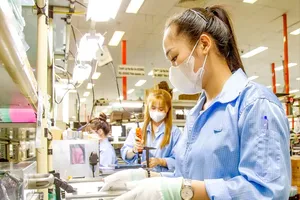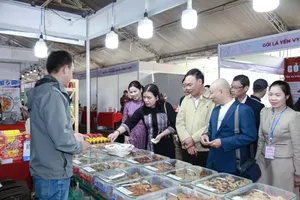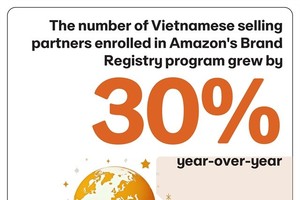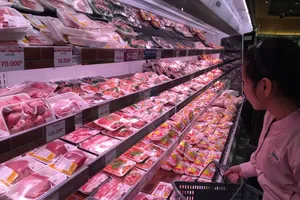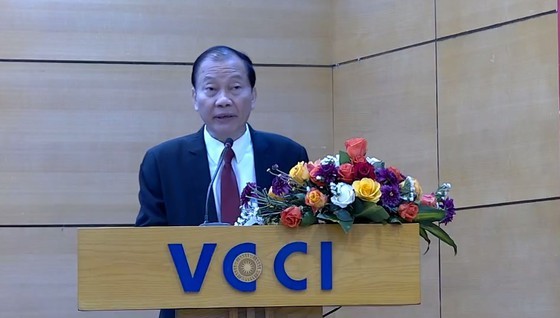 Mr. Hoang Quang Phong, Vice Chairman of VCCI, speaks at the seminar. (Photo: SGGP)
Mr. Hoang Quang Phong, Vice Chairman of VCCI, speaks at the seminar. (Photo: SGGP)
Mr. Hoang Quang Phong, Vice Chairman of VCCI, said that exporting vegetables and fruits is an advantage of Vietnam. "Currently, there is a clear shift in the proportion of Vietnamese fruit and vegetable products, with exports to Europe and America increasing and exports to Asia decreasing," he said.
According to Mr. Hoang Quang Phong, after a long lockdown to cope with the Covid-19 pandemic, at present, the demand for goods and food, especially vegetables and fruits, in the EU market is extremely huge. "Consumer demand for novel tropical fruits and vegetables in the EU has increased sharply. Specifically, fresh fruit and vegetable products increased by about 20-25 percent, and processed products rose by more than 30 percent," said the Vice-Chairman of VCCI.
According to Mr. Hoang Quang Phong, after a long lockdown to cope with the Covid-19 pandemic, at present, the demand for goods and food, especially vegetables and fruits, in the EU market is extremely huge. "Consumer demand for novel tropical fruits and vegetables in the EU has increased sharply. Specifically, fresh fruit and vegetable products increased by about 20-25 percent, and processed products rose by more than 30 percent," said the Vice-Chairman of VCCI.
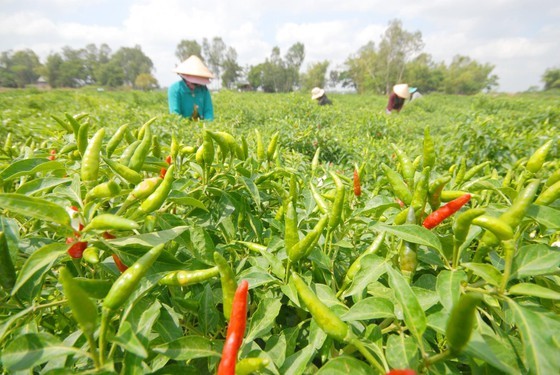 Mekong Delta farmers grow chilies to make spices for export. (Photo: MARD)
Mekong Delta farmers grow chilies to make spices for export. (Photo: MARD)
Although it is assessed to have many advantages, the Vice Chairman of VCCI said that Vietnamese fruit and vegetable products had not made use of the opportunities of the EU market, merely accounting for less than 1 percent of the market's demand. According to him, along with the limitations of unbalanced product structure, unstable output, and unsteady quality, Vietnamese small and medium-sized enterprises also face difficulties in accessing the European market, such as the lack of information and human resources to meet the requirements of European quality standards and lack of ability to access this market. Therefore, Oxfam and VCCI have collaborated to develop a project to strengthen the export capacity of small and medium-sized enterprises in the vegetable and spice industry in Vietnam. The project has been funded 80 percent by the EU to implement in 2022 and 2023. At the seminar, many enterprises said they wanted to find out information to promote the export of agricultural products, including vegetables and spices, to the fastidious market that still has a lot of room with high selling prices. However, enterprises are facing difficulties in harvesting, processing, and preserving technology, as well as complying with regulations on food safety and quality and looking for partners.
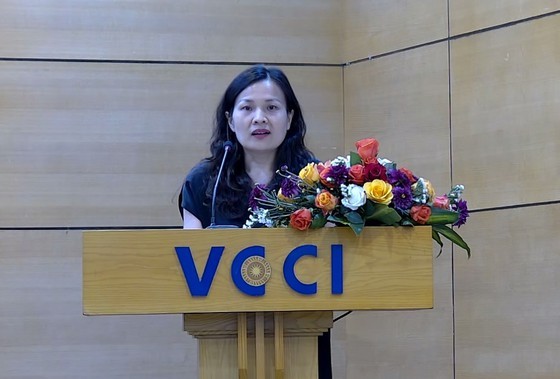 Ms. Vu Thi Quynh Hoa, Director of Oxfam in Vietnam, speaks at the seminar. (Photo: SGGP)
Ms. Vu Thi Quynh Hoa, Director of Oxfam in Vietnam, speaks at the seminar. (Photo: SGGP)
According to Ms. Vu Thi Quynh Hoa, Director of Oxfam in Vietnam, the more specific goal is to empower vegetable, fruit, and spice exporters, provide them with intensive support packages, update information on quality standards and regulations on the EVFTA, at the same time, support digital transformation so that Vietnamese small and medium-sized enterprises can increase exports of these products to the EU.
In 2021, the export value of vegetables and fruits to the European and American markets had high growth rates. Of which, exports to Europe reached US$303 million, up 17.4 percent compared to 2020, and to America touched $271 million, up 29.1 percent compared to 2020. Owing to that Europe's market share in the total value of Vietnamese fruit and vegetable exports climbed to 8.5 percent in 2021, and America's market share surged to 7.6 percent. Meanwhile, Asia's market share declined from 82.2 percent to 80 percent, mainly because China’s market share was reduced in the total value of Vietnam's fruit and vegetable exports.
In 2022, Vietnam's fruit and vegetable exports to the EU are forecasted to increase by 10-15 percent by the Import-Export Department under the Ministry of Industry and Trade, thanks to making good use of the EVFTA. Currently, the EU market's import volume of fruit and vegetables is about $100 billion per year.
In 2022, Vietnam's fruit and vegetable exports to the EU are forecasted to increase by 10-15 percent by the Import-Export Department under the Ministry of Industry and Trade, thanks to making good use of the EVFTA. Currently, the EU market's import volume of fruit and vegetables is about $100 billion per year.





